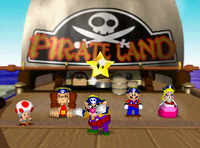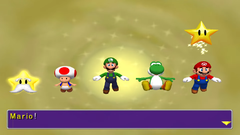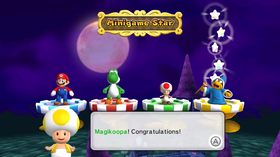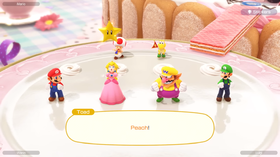Bonus Star: Difference between revisions
m (→Availability) Tag: Mobile edit |
Tags: Reverted Mobile edit |
||
| Line 429: | Line 429: | ||
|[[File:Check_mark.svg|17px]] | |[[File:Check_mark.svg|17px]] | ||
| | | | ||
| | |[[File:Check_mark.svg|17px]] | ||
|- | |- | ||
!Stompy Star | !Stompy Star | ||
Revision as of 15:06, January 12, 2025
- Not to be confused with Goal Star.
- “You may have chased Stars earlier! But these Bonus Stars come to you! Each counts toward your Star total!”
- —MC Ballyhoo, Mario Party 8
Bonus Stars are Stars that are given out at the end of a Battle Royale map in every game of the Mario Party series except Mario Party Advance and Mario Party: Island Tour. They are last-minute bonuses given to players (or teams) who have excelled in a particular field of gameplay during the game itself. So to say, the player who appears to be in first place at the end of the final turn may ultimately lose if an opponent receives enough Bonus Stars to surpass them.
Although Bonus Stars are usually optional, one must play with them in Mario Party; during Story Mode in Mario Party 3, Mario Party 4, and Mario Party 9; and during the Mario Party mode in Mario Party 10. They must play with them off during the story mode of Mario Party DS. Most Mario Party games have three Bonus Stars to be handed out. While they remained the same for the first six games, starting with Mario Party 7, games have had six potential Bonus Stars that could be awarded. However, only three stars would ever be awarded, and it was random as to which ones would show up for a game.
In the event of a tie for a Bonus Star, both, three, or all four players would receive one. In Battle Royale and Tag Team Mode, no one would get a Star in the event of a tie. The same goes for Duel Mode in Mario Party DS.
Up until Mario Party 4, Bonus Stars were identical in appearance to standard Stars. However, starting with Mario Party 5, each Bonus Star was given a unique look, with its own color and emblem on it.
In Mario Party 9 and Mario Party 10, Bonus Stars do not function the same way like in other games, since these games do not feature any coins or Stars to collect. Instead, each Bonus Star gives the player five Mini Stars (or ten bananas on DK's Jungle Ruins).
In Mario Party 10, only two Bonus Stars are awarded, mostly because there are only five types of Bonus Stars rather than six. In Mario Party: Star Rush, the number was changed back to three. However, in Super Mario Party, Mario Party Superstars, and Super Mario Party Jamboree, it was once again changed to two, but three Bonus Stars are given if the game lasts at least 20 turns in Super Mario Party, or 30 turns in both Mario Party Superstars and Super Mario Party Jamboree. In addition, Mario Party Superstars also added the option to have only the three classic Bonus Stars (the Rich, Minigame, and Eventful Stars) to be handed out at the end of the game, regardless of turn count, similarly to the first five Mario Party installments. Super Mario Party Jamboree retained this option, but it restricts the Minigame Bonus to 30 turn games.
Super Mario Party Jamboree also changes how Bonus Stars are distributed when a game is played with its new Pro Rules setting. Games are always 12 turns with one Bonus Star, and the chosen Bonus Star is announced at the beginning of the game as the Sightseer Bonus, the Happening Bonus, or the Slowpoke Bonus.
In Mario Party: Star Rush, Bonus Stars are exclusive to the Balloon Bash mode of the game. In Toad Scramble, they are called "Bonuses" instead and players receive coins if rewarded with a bonus.
Types of Bonus Stars
- Minigame Star: The Minigame Star (originally spelled Mini-Game Star and Mini-game Star) has appeared in every Mario Party game to date. It is awarded to whoever collected the most coins in every minigame altogether. Coins won from Battle (pre-Mario Party 5), Duel, Game Guy, and Donkey Kong minigames are not accounted for. In Mario Party 9, Mario Party 10, Mario Party DS, Mario Party Superstars, and Super Mario Party Jamboree, the number of minigame wins is counted instead.
- Coin Star: This Bonus Star first appeared in Mario Party and appeared in every subsequent game up to Mario Party 5. It is awarded to whoever held the most coins at any time during gameplay.
- Happening Star: Also known as the Event Star, Green Star, Action Star, or ? Star, the Happening Star has appeared in every Mario Party game until Mario Party 9, returning in Super Mario Party, Mario Party Superstars, and Super Mario Party Jamboree as the Eventful Star. It is awarded to whoever landed on the most ? Spaces/! Spaces during gameplay.
- Orb Star: Appearing in Mario Party 6, Mario Party 7, Mario Party 8 (as the Candy Star), Mario Party DS, Mario Party: Star Rush, Mario Party: The Top 100, Super Mario Party, Mario Party Superstars, and Super Mario Party Jamboree (as the Item Star), this Star is given to whoever used the most Orbs, items, or Candies during gameplay. It replaces the Coin Star in Mario Party 6.
- Red Star: This Bonus Star appears in Mario Party 7 and Mario Party 8, returning in Super Mario Party and Mario Party Superstars as the Unlucky Star. It is given to whoever landed on the most Red Spaces during gameplay. In Super Mario Party, it also counts the number of Bad Luck Spaces and Extra Bad Luck Spaces landed on. It reappears in Super Mario Party Jamboree as the Misfortune Star, and it tracks Red Spaces and Unlucky Spaces.
- Running Star: This Bonus Star appears in Mario Party 7, Mario Party 8, and Mario Party DS, returning in Mario Party: Star Rush, Super Mario Party, Mario Party Superstars, and Super Mario Party Jamboree as the Sightseer Star. It is given to whoever moved the most spaces altogether by rolling the Dice Block.
- Shopping Star: This Bonus Star appears in Mario Party 7 and Mario Party 8. It is given to whoever spent the most coins at Orb huts and Candy Shops, respectively. Shops that Bowser runs (through Bowser Time) count towards this total. It returns in Mario Party Superstars and Super Mario Party Jamboree, where the number of items bought at Item Shops is counted instead.
- Friendship Star: Appearing only in Mario Party DS, this Bonus Star is given to whoever landed on the most Friend Spaces during gameplay.
- Hex Star: Appearing only in Mario Party DS, this Bonus Star is given to whoever threw the most Hexes.
- Dice Block Star: Appearing in Mario Party 9 and Mario Party 10, this Bonus Star is given to whoever used the most Special Dice Blocks throughout the course of the game.
- Far Star: Appearing in Mario Party 9 and Mario Party 10, this Bonus Star is given to whoever had the highest total from hitting Dice Blocks throughout the course of the game. (This is similar to the Running Star, but it has a description to fit the new vehicular movement mechanic.)
- Minus Star: Appearing in Mario Party 9, this Bonus Star is given to whoever collected the most Mini Ztars (or Z-Bananas on DK's Jungle Ruins) throughout the course of the game. This Bonus Star also appears in Mario Party 10, but instead, it is given to whoever lost the most Mini Stars overall.
- Slow Star: Appearing in Mario Party 9 and Mario Party 10, this Bonus Star is given to whoever rolled the lowest Dice Block total throughout the course of the game. It reappears in Mario Party: Star Rush, Super Mario Party, Mario Party Superstars, and Super Mario Party Jamboree as the Slowpoke Star.
- Spin Star: Appearing only in Mario Party 9, this Bonus Star is given to whoever landed on the most Spin Spaces throughout the course of the game.
- Balloon Star: Appearing in Mario Party: Star Rush, this Bonus Star is given to whoever popped the most balloons.
- Champion Star: Appearing in Mario Party: Star Rush, this Bonus Star is given to whoever is the "undeniable minigame champion." This likely refers to the player who won every single minigame in a round or won the most out of everyone.
- Almost Star: Appearing in Mario Party: Star Rush, this Bonus Star is given to the player who collected the fewest Star Balloons. This Bonus Star returns in Mario Party: The Top 100 as the So-Close Star.
- Anti-Items Star: Appearing in Mario Party: Star Rush, this Bonus Star is given to the player who collected the fewest items. This Bonus Star returns in Mario Party: The Top 100 as the Unused Star.
- Ally Star: Introduced in Super Mario Party, this Bonus Star is given to the player who has collected the most allies in a game.
- Buddy Star: Introduced in Super Mario Party, this Bonus Star is given to the player who has collected a randomly selected buddy. The game determines the "lucky" buddy when determining which Bonus Stars will appear for the game. This Star is similar to the "Lucky Ally Bonus" seen in Mario Party: Star Rush.
- Rich Star: Introduced in Super Mario Party and reappearing in Mario Party Superstars and Super Mario Party Jamboree, this Bonus Star is awarded to the player who collected the most coins total throughout the game, including coins spent and stolen from them. Unlike the Coin Star in previous installments, it does not calculate who held the most coins at any given time.
- Doormat Star: Introduced in Super Mario Party, this Bonus Star appears only in the Partner Party mode. It is given to the player who is stomped on the most times by other players. This happens when another player moves through their space.
- Stompy Star: Introduced in Super Mario Party, this Bonus Star appears only in the Partner Party mode. It is given to the player who stomps on other players the most times. This happens when the player moves through another player's space.
- Bowser Space Star: Introduced in Mario Party Superstars and reappearing in Super Mario Party Jamboree, this Bonus Star is given to the player who landed on the most Bowser Spaces.
Availability
The Mario Party series features 23 Bonus Stars along 16 games. From Mario Party to Mario Party 6, only three Bonus Stars are available. Since then, the number of Bonus Stars has been increasing. Mario Party 7, Mario Party 8, Mario Party DS, and Mario Party 9 increase the number to six. Mario Party 10 features five Bonus Stars. Mario Party: Star Rush and Mario Party: The Top 100 increase the number again to eight Bonus Stars. Super Mario Party has the most Bonus Stars: 11. Mario Party Superstars and Super Mario Party Jamboree have nine Bonus Stars each.
| Bonus Star | Mario Party | Mario Party 2 | Mario Party 3 | Mario Party 4 | Mario Party 5 | Mario Party 6 | Mario Party 7 | Mario Party 8 | Mario Party DS | Mario Party 9 | Mario Party 10 | Mario Party: Star Rush | Mario Party: The Top 100 | Super Mario Party | Mario Party Superstars | Super Mario Party Jamboree |
|---|---|---|---|---|---|---|---|---|---|---|---|---|---|---|---|---|
| Minigame Star | ||||||||||||||||
| Coin Star | ||||||||||||||||
| Eventful Star | ||||||||||||||||
| Item Star | ||||||||||||||||
| Sightseer Star | ||||||||||||||||
| Shopping Star | ||||||||||||||||
| Misfortune Star | ||||||||||||||||
| Hex Star | ||||||||||||||||
| Friendship Star | ||||||||||||||||
| Slowpoke Star | ||||||||||||||||
| Dice Star | ||||||||||||||||
| Minus Star | ||||||||||||||||
| Spin Star | ||||||||||||||||
| Balloon Star | ||||||||||||||||
| So-Close Star | ||||||||||||||||
| Unused Star | ||||||||||||||||
| Duel Star | ||||||||||||||||
| Rich Star | ||||||||||||||||
| Ally Star | ||||||||||||||||
| Buddy Star | ||||||||||||||||
| Stompy Star | ||||||||||||||||
| Doormat Star | ||||||||||||||||
| Bowser Space Star |
Gallery
- For this subject's image gallery, see Gallery:Bonus Star.
Names in other languages
- For a list of the Bonus Star names in other languages, see List of Bonus Star names in other languages.
| Language | Name | Meaning | Notes |
|---|---|---|---|
| Japanese | ボナス ポイント[?] Bōnasu Pointo |
Bonus Point | Mario Party |
| ボーナススター[?] Bōnasu sutā |
Bonus Star | since Mario Party 2 | |
| Dutch | Bonusster[?] | Bonus Star | |
| French | Bonus de points[?] | Bonus Points | Mario Party |
| Etoile Bonus[?] | Bonus Star | since Mario Party 2 | |
| German | Bonus[?] | Bonus | Mario Party |
| Bonus-Stern[?] | Bonus Star | since Mario Party 2 | |
| Italian | Stella Bonus[?] | Bonus Star | |
| Korean | 보너스 스타T[?] Boneoseu Seuta |
Bonus Star | |
| Portuguese (NOA) | Estrela Bônus[?] | Bonus Star | |
| Portuguese (NOE) | Estrela Bónus[?] | Bonus Star | |
| Russian | Бонусная звезда[?] | Bonus Star | |
| Spanish | Estrella Bonus[?] | Bonus Star | Mario Party 2 |
| Estrella de Bonus[?] | Mario Party 3/4/5 | ||
| Estrella de bonificación[?] | since Mario Party 6 |
- Stars
- Mario Party items
- Mario Party 2 items
- Mario Party 3 items
- Mario Party 4 items
- Mario Party 5 items
- Mario Party 6 items
- Mario Party 7 items
- Mario Party 8 items
- Mario Party 9 items
- Mario Party 10 items
- Mario Party DS items
- Mario Party: Star Rush items
- Mario Party: The Top 100 items
- Super Mario Party items
- Mario Party Superstars items








